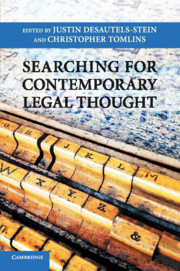For more than a century, law schools have trained students to 'think like a lawyer'. In these times of legal crisis, both in legal education and in global society, what does that mean for the rest of us? In this book, thirty leading international scholars - including Louis Assier-Andrieu, Marianne Constable, Yves Dezalay, Denise Ferreira da Silva, Bryant Garth, Peter Goodrich, Duncan Kennedy, Martti Koskenniemi, Shaun McVeigh, Samuel Moyn, Annelise Riles, Charles Sabel and William Simon - examine what is distinctive about legal thought. They probe the relation between law and time, law and culture, and legal thought and legal action; the nature of current legal thought; the geography of legal thought; and the conditions for recognition of a new 'contemporary' style of law. This work will help theorists, social scientists, historians and students understand the intellectual context of legal problems, legal doctrine, and jurisprudential trends in the current conjuncture.A few blurbs:
‘In this strikingly provocative collection, an international group of some of the most interesting and original minds in the legal academy asks whether there is such a thing as ‘contemporary legal thought', or only the shards and fragments of exhausted prior movements and systems. Some contributors see only the ruins; others, possibilities for making postmodern pastiches out of the fragments; still others point to wildflowers - prospects for novel approaches to understanding law that may someday crystallize into more general theories. The book is designed to disturb conventional views of law and legal theory; and it does so, with panache.' -- Robert W. Gordon
‘This brilliantly conceived collection seeks to explore what is new and distinctive in contemporary legal thought. The authors draw out the complex relations between theory and practice, past and present, faith and suspicion, information and thought, fragmentation and creation, and critique and innovation that are at the heart of contemporary performances of legality. The result is an invitation to take seriously the question of what styles and practices of legal thought might be adequate to this time of crisis in the institutions of law.' -- Anne Orford
More information is available here.
